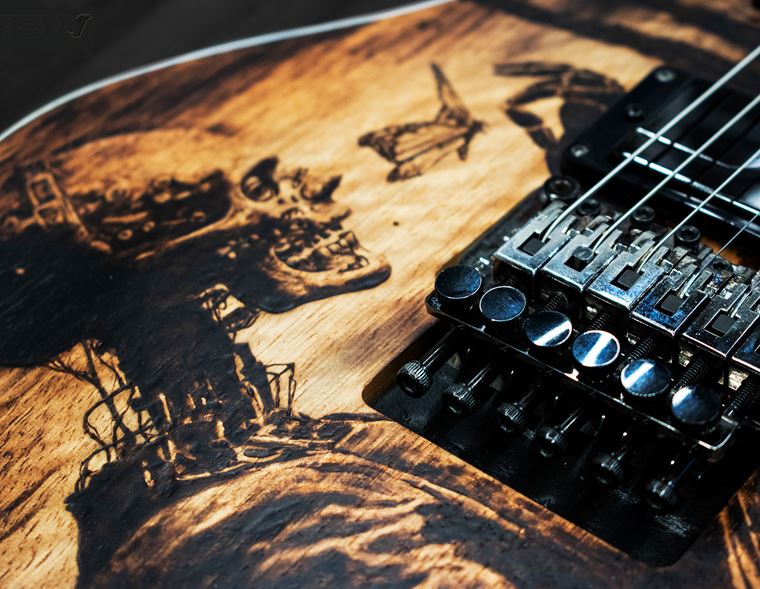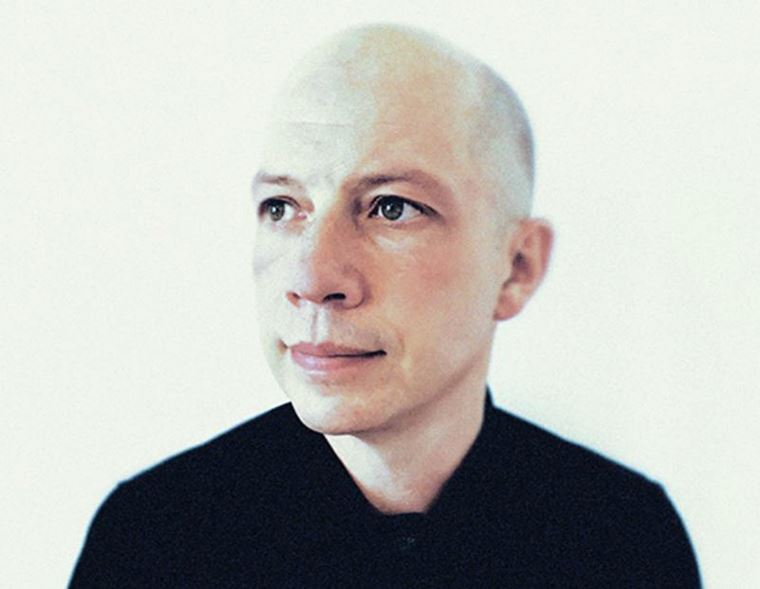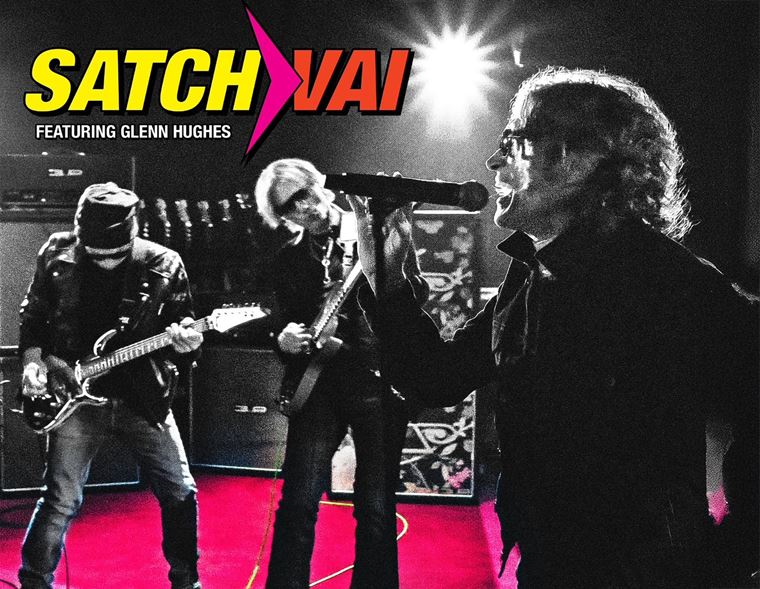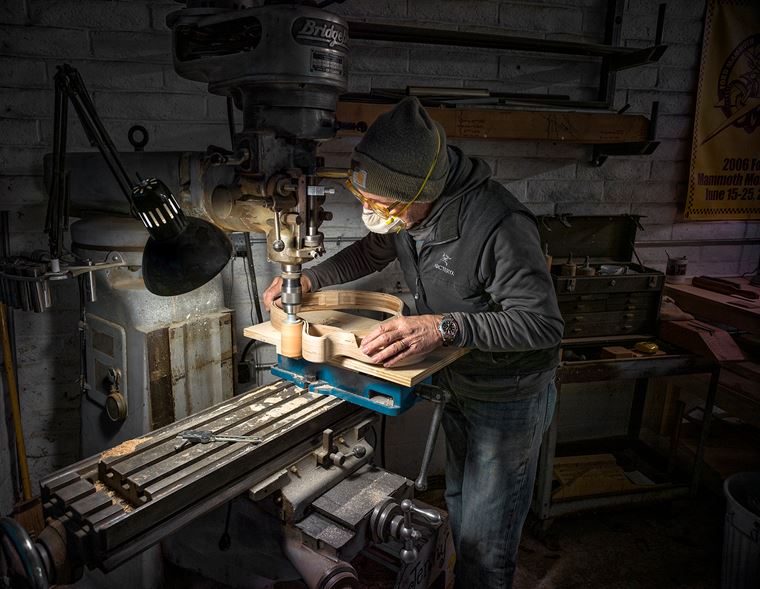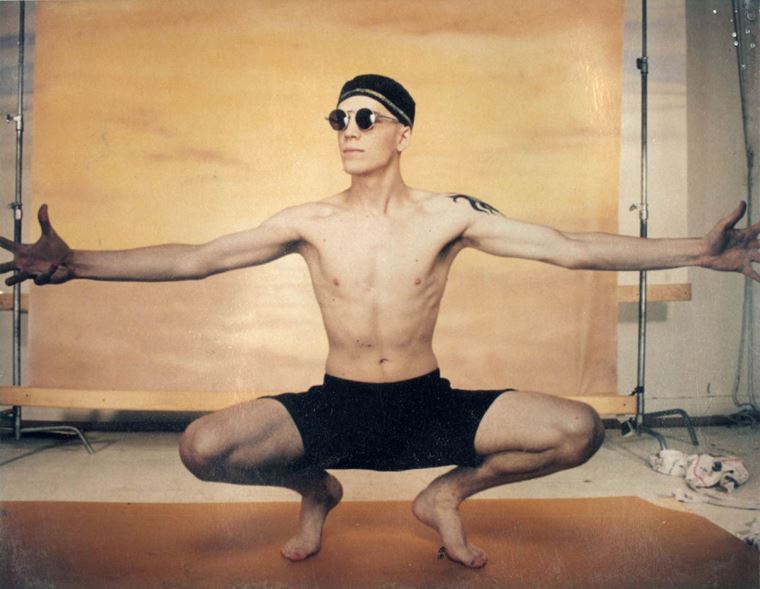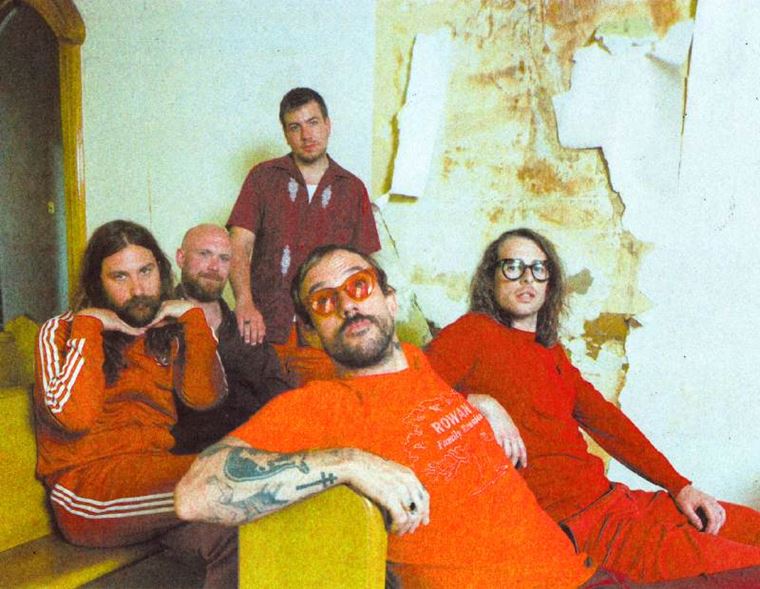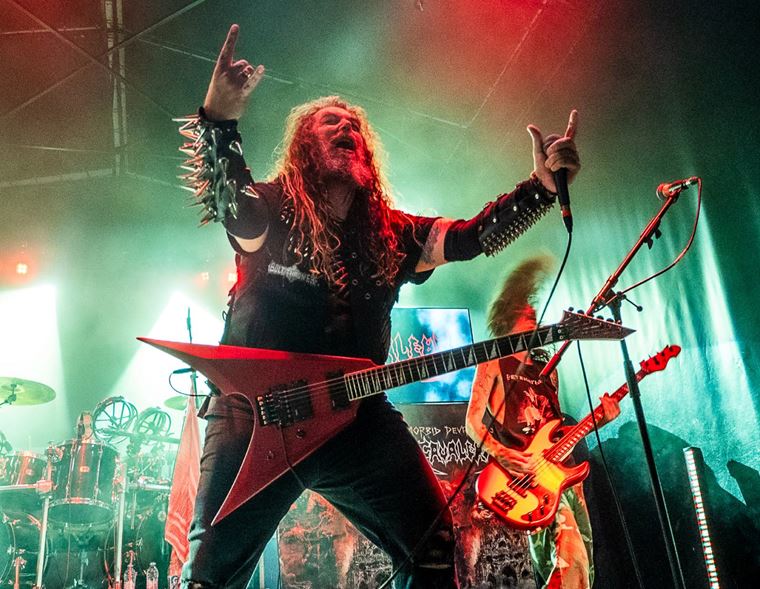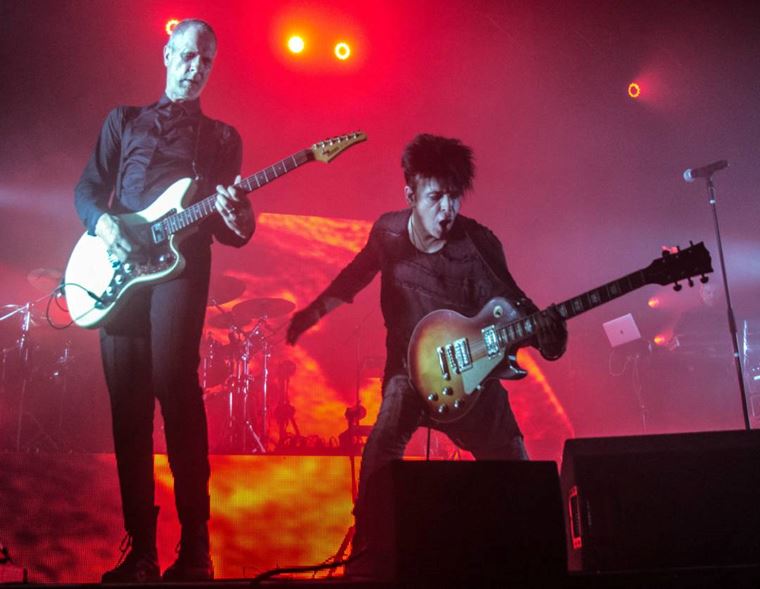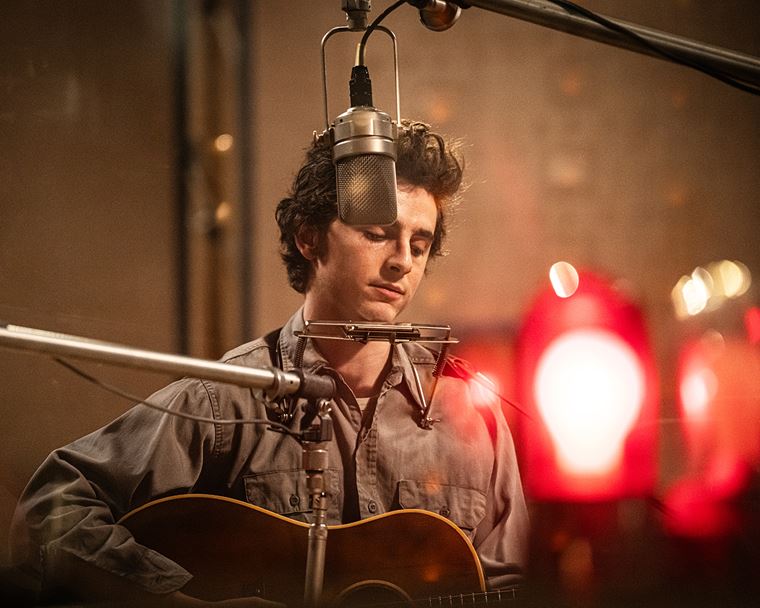The Cult: Billy Duffy on White Falcons and Morrissey
Ocassionally, when doing this particular job, it is possible to sometimes get a little bit star-struck. It actually doesn't happen too often, I'm glad to say. Despite the privilege of getting to spend time with some exceptional people, it's important to be a professional and look past these feelings, no matter how loudly the inner fanboy is gurgling and yelling inside you. You quickly learn that people are just people, regardless of any attached relevance or historical importance. Plus, we all have our jobs to do!
But now and then, it has to be said, you do get a sense of...something. Some people just have a 'famous' thing about them and can't help it. Take Billy Duffy, for instance. In person, you'd struggle to find a more down-to-earth, matter-of-fact, friendly man anywhere. Easy to laugh, quick with a deadpan, witty response and with a body language that's relaxed and comfortable, chatting to him is like talking to your mate down the local pub. A good guy, basically.
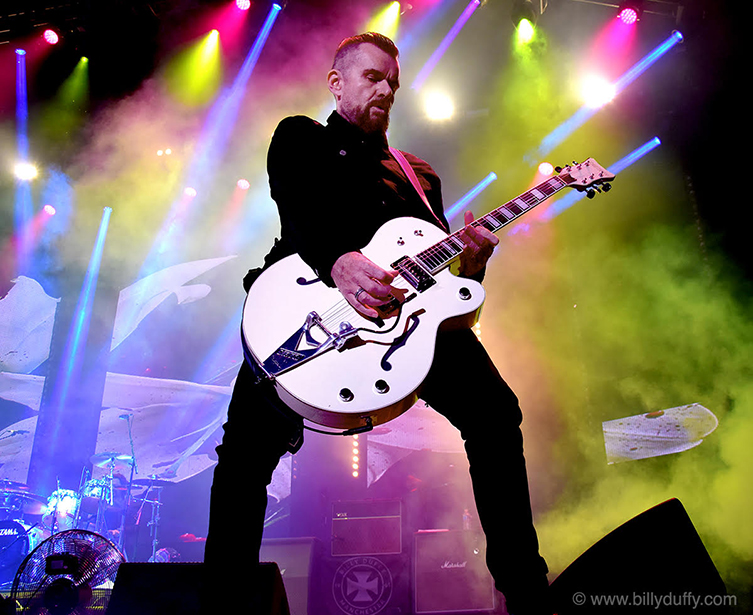
It's just that sometimes, you catch a glimpse coming through. Not of Billy, the man wearing a flat cap and nursing a cold, but of Billy Duffy, the iconic mega-star guitarist of The Cult: that blonde guy with the White Falcon guitar, pulling poses and contributing to that timeless image of the denim-clad classic rockstar. This glimpse I'm describing is a little flash that comes briefly and vanishes just as quick, but it's definitely there. It's part of what makes you smile about it all after it's done, but while you're in the throws of actually chatting to the person, it's a funny feeling, while it lasts.
So, it's a chilly Tuesday afternoon when I find myself at the back door of the O2 Academy. I'm a couple of minutes early, and showtime is still four or five hours away, but there are still a couple of Cult fans hanging around nearby, waiting for a glimpse of their heroes. From time to time, various bearded, Vans-wearing crew members come and go from the tour bus, nodding a hello but otherwise uninterested in this stranger within their midst. After fifteen or so minutes of making small-talk with the venue security and sticking my nose in whichever book I had on my person, the tour bus door opened and a man came out. He was about my height, bearded, and was wearing a hoody up over a black flat cap, seemingly to shut out the cold. The glint in his bespectacled eyes was unmistakable.
"You the journo?," came a thick Mancunian accent. Shaking hands, Billy led me through the venue's back doors and up some stairs to his dressing room. Generally speaking, most well-known artists are friendly, decent people. Even those that have certain reputations tend to be, in my experience at least, perfectly pleasant and happy to chat, as long as you a normal level of respect and don't hit them with rude or ridiculous questions. Still, I always hold a certain portion of nervous energy in my gut in case I get stunned by an irate rock star temper! You never know, do you?
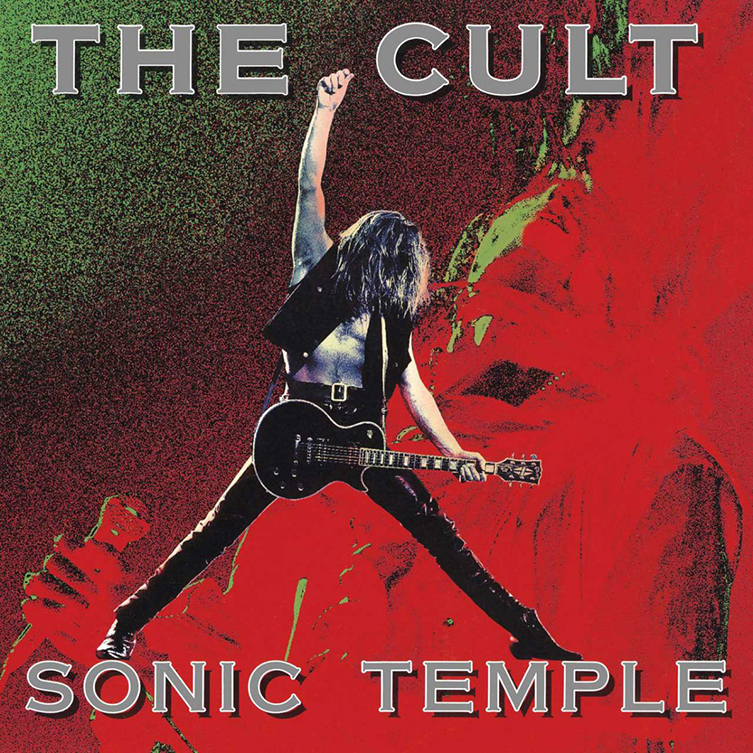
Thankfully, there was no need to worry this time! As mentioned, Billy was fantastic company. He's a very easy man to spend time with, and listening to him talk and tell stories is extremely entertaining. He's full of very dry wit indeed, and has a playful sense of humour. Also, it's easy to tell that he's an old hand at interviews: he is very good at putting his point across in a way that is informative and appealing.
One thing that always gets lost in a printed interview is the way a person says something. Ive tried here to include, through punctuation and italics, Billy's inimitable way of speaking, and I hope you get a little of that from how it reads. If, at any point, his words come across as overtly serious, I would advise that you add a pinch of sly comedy to how you're hearing it being said in your head, since that's most likely how it was said! Dry Mancunian humour doesn't always translate well to print!
We spoke for a good while, bringing in topics like Sonic Temple - the album the Cult are touring to celebrate this year on it's 30th anniversary; his famous guitar sound; coping with feedback; Morrissey and even how to hold a plectrum. As usual with these in-person interviews, I've found it more illuminating, and hopefully entertaining, to simply transcribe our full coversation. Afterwards, I spent time with Billy's guitar tech, but we'll get to that. First, here is what we spoke about...
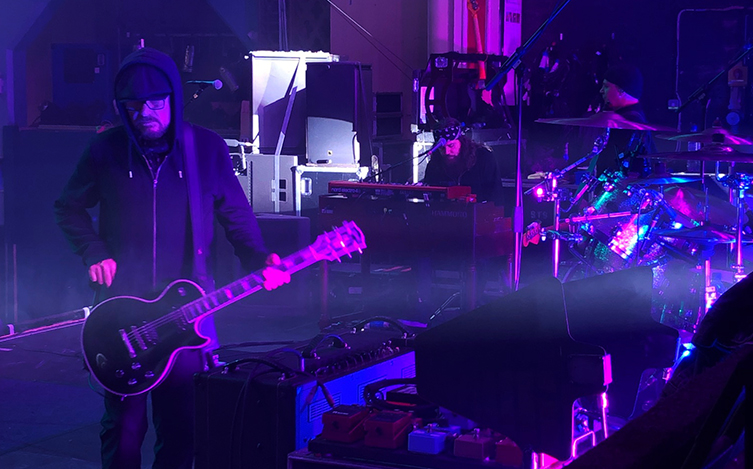
guitarguitar: So, the first thing I’d like to talk about is your actual sound!
Billy Duffy: Right, right.
GG: Because, I don’t know if you’d agree with it but your sound, to me, is like a distorted, Rocking sound...
BD: Right...
GG: But it’s not a Metal sound. It’s not heavy.
BD: No, it’s definitely not Metal.
GG: You’ve kind of straddled that kinda...
BD: (smiles) Yeah, yeah, yeah
GG: Or rather, it’s heavy, but it isn’t metal.
BD: Yeah, it’s a difficult one. It’s a tricky one, because the sort of sound started with more of a Gretsch thing really early on. It was a little bit thinner and chimier, you know, like in the early 80s, and then I just starting ‘heavying’ it up! I always used a Marshall but I also used a Roland as well.
GG: A Jazz Chorus?
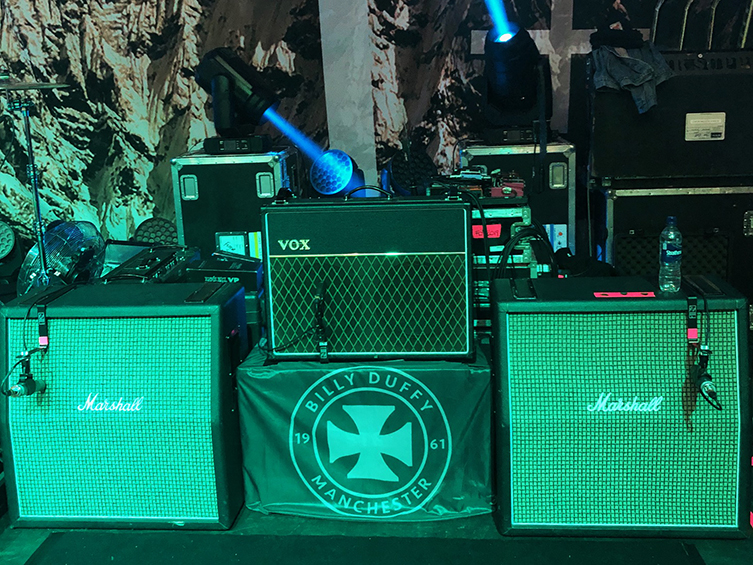
BD: Together, always together. And, um, I just started heavying it up and I just started seeing, kinda, how the band evolved into a more Rock, less Indie, more mainstream Rock sound. The guitar sort of went along with that. It was like, say, the tracks on the Love album like The Phoenix, which was like: ‘what would it be like if I just played wah-wah? A lot!’ And did this (type of part) on top of that thing.
Also, the track ‘Love’, and ‘Rain’ to an extent. You know, She Sells Sanctuary was recorded slightly previously so it was still a bit jangly, so it was more about a lot of other things, it wasn’t really about...it was about the riff more than the sound but the heaviness...it’s just something that evolved, but then it became...I’ve always tried to, you know, the easiest thing to do is to plug a good Les Paul into a good Marshall amp, you’re gonna get Electric.
GG: (laughs) Sounds dealt with.
BD: Y’know what I mean? (laughs) If that’s what you want, that’s what you’re gonna get! But, the key words in the sentence are ‘good’ and ‘good’. Not ‘Les Paul’ and ‘Marshall’. (laughter) I think a lot of the Metal bands, they tend to...well, there’s a philosophical thing I want to make: as a band, we’ve always tried to aim our music from the waist down, and I think Metal music generally is, mostly, aimed from the waist up.
GG: Aye, if I was to try and interpret that...(Billy laughs), waist down, you’re talking about basically getting the girls involved, right?
BD: (nods his head) Rock n Roll, Led Zeppelin.
GG: Swagger, vibe and groove.
BD: Yeah, yeah, the other thing’s more of a physical, headbanging...now, there’s time for a bit of that!
GG: Yeah, plus Metal is often ‘waist up’, as you say, in terms of it being often very technique based. And you certainly have your moments with solos and so on, but it’s not...
BD: Yeah, I’m not, I’ve never really, it’s always been more about sorta songwriting and riffs with me, with a bit of soloing where necessary rather than, I’ve never been that, y’know, dextrous or a quick learner, so...and honestly, when I grew up, it wasn’t that important.
GG: Aye.
BD: It was actually the opposite of important. You know? Being kinda like punk and post-punk. It was more about creating your own sound, and being interesting, getting riffs and exploring. Cos Steve Jones already had the best guitar sound, y’know, following on from Rock, and Mick Ronson and Jimmy Page and Hendrix...
GG: Yeah, subject’s covered.
BD: Yeah, done! Y’know, James Williamson, the New York Dolls had a pretty good tone...it was kinda done! So, I always felt that there was a surge to find something...that’s why I ended up with Gretsch, because it sounded different.
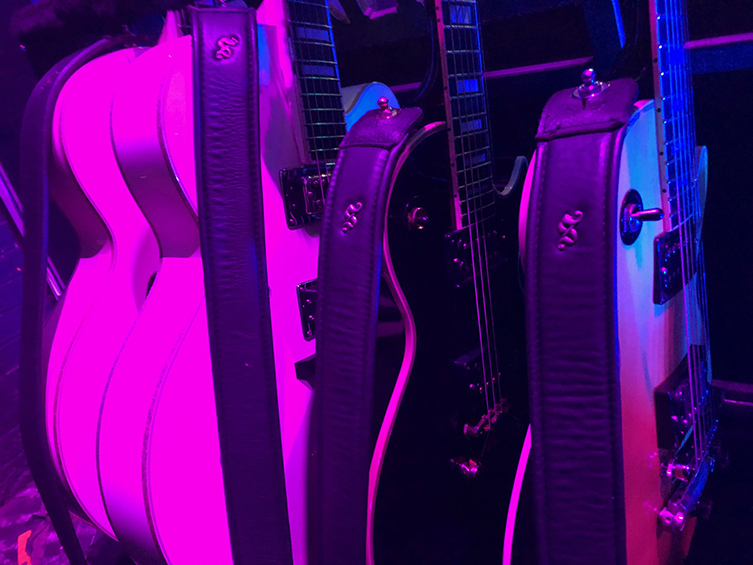
GG: I was going to ask about the Gretsch White Falcon, because I know you use the Les Paul quite a lot, but the Gretsch is the obvious Cult guitar.
BD: Yeah, yeah.
GG: So, looks are important, and it’s a beautiful looking guitar. Did you just go: ‘that looks wicked, I’m having a shot of that’?
BD: Yeah! Originally it was just, yeah, I wanted a white guitar when I got in Theatre of Hate, the band prior to the Cult. I did spend all my savings on a... I couldn’t find a single cutaway one, which is the one I wanted...
GG: Right.
BD: Cuz I’d seen Matthew Ashman from Bow Wow Wow play one. I saw their first ever gig at Hammersmith Roller-skating rink and I always loved that guitar. And I’d seen them obviously with Malcolm Young and Neil Young, and when I got the gig in Theatre of Hate, I actually had a Les Paul Junior, double cutaway, Cherry!
GG: Nice!
BD: Nice guitar, but kinda the antithesis of a Gretsch White Falcon! It’s a bit like going from a Morgan to a Range Rover, you know what I mean? (laughs) So, Falcons became the thing and they just became identifiable with the band. I’ve always basically used those two guitars: Les Pauls and the Gretsch.
The heaviness has always been there, and it was the journey from the beginning of the band, where it was quite fragile and spacious, which wasn’t without its charms: it allowed Ian (Astbury, The Cult’s lead vocalist) to express himself in his early vocal style. It just evolved into a more textured, layered, thicker sound, as music in general got over the fact that punk was actually dead.
GG: Yes.
BD: And Rock came back and, well, we all know what happened. Guns n Roses happened, really, in the grand scale. So, everybody had a headband, you know what I mean? (smiles) Rock became massive at the time we were doing our thing and going to America, and evolving into more of a straight-ahead...
GG: The timing was perfect for you.
BD: Yeah, you know, for once we were lucky! I think we contributed to it as well, a little bit, in that making Electric was a bold statement, for a band who’d had hits with Love 18 months before! Do you know what I mean? It wasn’t on the back of failure. And we just rolled the dice big time because we believed in Rick (Rubin, producer) and we believed in ourselves. And we’d basically screwed up the recording of the follow-up, a little bit.
GG: Oh, okay!
BD: So, we were a bit desperate at that point: cos it wasn’t right, and we’d wasted all that money and we were kinda like: ‘Well, we’ll put all the fuckin’ money on red for Rubin!’
GG: Yeah!
BD: Know what I mean? Yeah, we just rolled the dice and he was confident.
GG: It’s also like destiny a bit.
BD: Yeah, looking back it was, yeah. At the time, there were loads of other options we could’ve done, but. So that was it. So eventually, to finish it up, going out on the Electric tour, whilst the album was recorded with Les Pauls and a Marshall - because we didn’t go to New York to record an album, we only went to do a track, so we were gonna rent everything. Well, we did rent everything, but we ended up cutting the whole album there with rented gear - I went out on tour to promote Electric, initially starting with the Falcon, there was a bit of a Les Paul knocking around as well but it was mostly Falcon, and I just realised that I couldn’t get what I needed to get. You know, we went out and did arenas supporting Billy Idol and so immediately you’re in a whole different world of what you need to do to perform and to present. You’re out of the theatres, even. Other level.
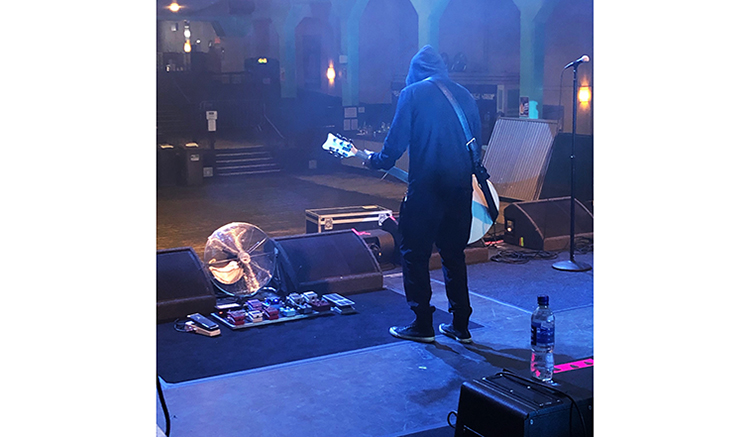
GG: It’s a bigger canvas.
BD: Yeah: other level, other level! You know, it was like: ‘Oh! Okay...this is...’ We’d done Wembley, we supported Big Country there once, but we hadn’t gotten big enough to play a Wembley arena-type thing ourselves at that point, but we were heading in that direction. We just weren’t quite there yet.
So, I’d started the first tour, and Steve Stevens (Billy Idol’s guitarist) was up there doing his thing and I’m trying to compete with that, with the Falcon, and it’s just, I was struggling! And then Guns n Roses opened for us on our tour, and Slash’s beavering away on his Les Paul, so I kinda had to go back to the Les Paul, just out of necessity.
GG: Got you. I was gonna ask about the whole White Falcon situation because, whenever I’ve gigged myself with hollow body guitars, it’s a pain in the arse for feedback!
BD: Oh, it’s horrible, yeah.
GG: Any amount of volume, you stand a certain way and it’s BROOOOOOOOO!
BD: Yeah, yeah, you get that unpleasant sort of low...what’s that thing off Star Wars? Animal that talks like that? (does a low, rumbling vocal noise)
GG: Jabba the Hutt?
BD: Yeah, Jabba the Hutt. I’m not a Star Wars guy. But it becomes that!
GG: Hahaha! I love that! So, how do you get around it?
BD: I fill it full of stuff! At one point it was old t-shirts, hence on the signature model (Billy’s signature Gretsch White Falcon) they would put – we would use cut up towels and stuff – but realistically it became, when I finally got a roadie of some sophistication, they started using like acoustic foam. You know, triangles, and they’d stuff it in through the f-holes.
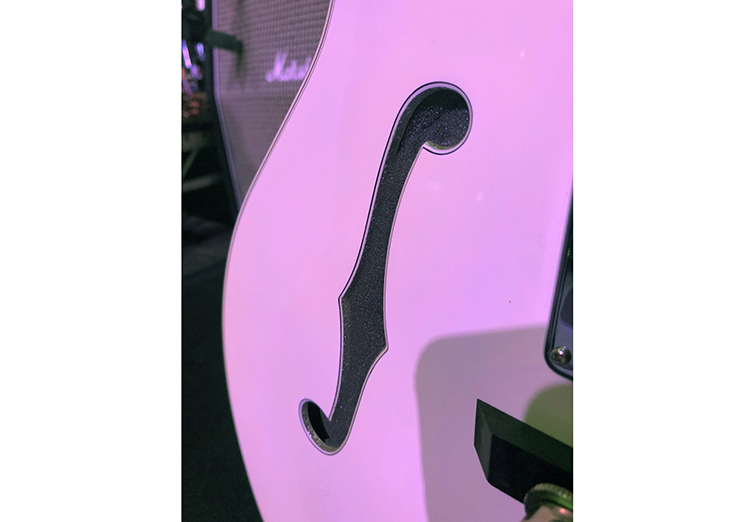
GG: Does that help keep the weight down?
BD: Well, it’s still not light, but it keeps the feedback manageable. The Signature models, well originally, the 1975 Falcon that was the one in Sanctuary, I had the pickup changed, because there wasn’t enough output. That era of Gretsch, the pickups were particularly shit.
GG: Hahahaha!
BD: Cuz in the 60s, they had the Filter’Trons and such. They were pretty good pickups! The guitars were put together a bit janky, you know, I’d probably snap one, the way I play, but the 70s guitars, made by Baldwin, were under licence, because all Gretsches are made under licence. There is no Gretsch guitar factory, it’s a drum place.
GG: Yeah, these days it’s Fender who make them.
BD: Yeah, but all done under the licence.
GG: I didn’t realise it was Baldwin in the 70s!
BD: Yeah, yeah, the Baldwin era. The ones I play are the 70s ones, smaller f-holes...
GG: Yes, I’ve noticed that.
BD: Significantly smaller f-holes than the 50s and 60s, that changes it a lot. So that, stuff the holes full of stuff, change the pickups. Seymour Duncan wound me a special pickup and that was the one we kinda copied to put in the signature model. Then little things: you pin the bridge, just stuff that you would do anyway.
GG: There needs to be a bit of maintenance with any Gretsch, though.
BD: Yeah, yeah. I mean, one thing that’ll probably be cool after we’re finished here is if you have a quick chat with my guitar tech, if you have any technical questions. (Indeed we do, please see below)
GG: Oh thank you!
BD: Cuz, you know, he knows all the technical shit. He’s got tricks, cuz they’re not easy. But they’re manageable! But I’m a big fan of the 70s era Baldwin Falcons minus the shit pickups. Just underpowered, awful, breathless things without really having any great tonal qualities to compensate! So, that’s what I did: just took care of that and then filled it up with stuff.
GG: So you like a slightly hotter pickup?
BD: Yeah! Because I go between that and a Les Paul and I don’t want to re-map the amp.
GG: That’s one thing: like with a Les Paul and a Strat, it’s the volume difference, but it’s not only that: there’s a...kind of ‘musculature’ of sound involved...
BD: Yeah! It’s a different thing. But as Mr Astbury says, anybody who goes on stage professionally and plays a semi-acoustic, loud, in a Rock world, deserves a bit of credit.
GG: Yes.
BD: Cos it’s a man’s guitar! (smiles)
GG: Hahahaha!
BD: It’s a lot easier to do it other ways.
GG: Absolutely.
BD: So, it’s a labour of love, and I still endeavour to do it. I’m working on something with Gretsch that’s coming out maybe next year that’s between the two. So, hopefully I’m gonna get another signature model. They seem pretty happy with the Falcon: we’ve been doing it 8 or 9 years now. We’re working on something for the guy that can’t have both, this might be good enough.
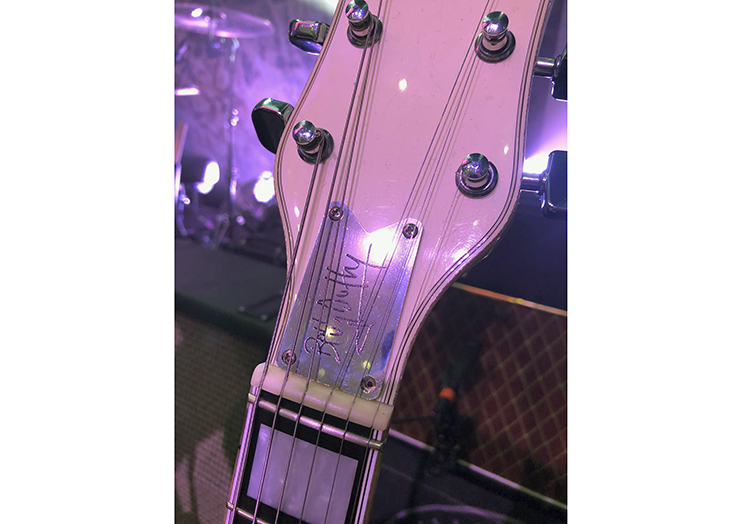
GG: Can you reveal anything about that just now?
BD: Well, just that it’s a Les Paul sized guitar, based on a (Gretsch) Jet, you know, based on that Pro range, the good one they brought out, that new one, the 6228 Pro Jet whatever. It’s based upon that but I’m tweaking it, dialling it into what I need. It’s definitely a guitar that’s...for me, it would definitely fit in between both (the Les Paul and the White Falcon) but for a guy who’s only got a certain amount of money.
GG: And he wants the best of both worlds.
BD: Yeah, well it might be the worst of both worlds! I’m trying to make it not the worst of both worlds! Haha! I don’t think it’ll be the best of both worlds. I think that’s when you get a compromise. It’s a bit like anything, you know, car design: when you try and compromise, something’s gotta give, it’s a question of how much.
GG: It’s kinda like those digital guitars: you turn a dial and it’s a 12 string acoustic! Now it’s a Les Paul!
BD: Yeah, yeah.
GG: Maybe I just want the actual guitar that makes that one sound!
BD: Well, there’s that, yeah! I mean, it’s a question of, for me, not making it the worst of both worlds, haha.
GG: Yeah! Sometimes it really works: look at a Telecaster with a neck-position humbucker.
BD: Yeah!
GG: It’s like a wee dunt into a different world and that’s perfect.
BD: Yeah, I mean, that’s the fun thing about it! At the end of the day it’s just a bit of wood with some strings on it, you know, it’s like 1950s technology, really, for the most part.
GG: Isn’t that weird? We (guitar players) don’t really want to know about anything since then.
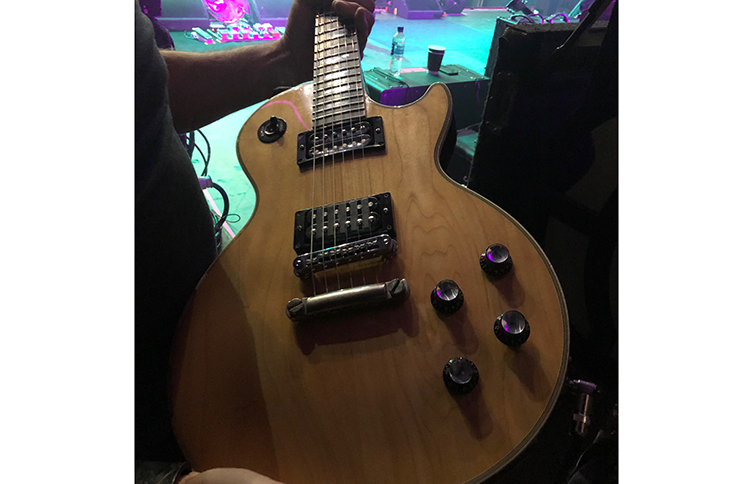
BD: Not really! I mean, I don’t! But there’s not much since then that I’ve really thought’s great.
GG: Gretsches aren’t all that easy to play.
BD: No, they’re not, certainly not if you have to play ‘em low. And it’s best not having a big belly (laughs) cos they just stick out. But there’s a few things. One of the other things I do is, I run the amp kinda hot, and I use two amps – everybody’s like ‘Ooh, you get a great sound out of that AC30’ and I’m like ‘Yeah, well there’s a Marshall as well...the AC30, I like ‘em to be, I don’t like them to sound like two amps, it’s meant to sound like one super-amp and I’ve found that the Chinese ones...Vox are great, they kind of endorse me and they were like ‘Have an expensive hand-made one!’ and it was too honest! I said no, I like the Chinese ones!
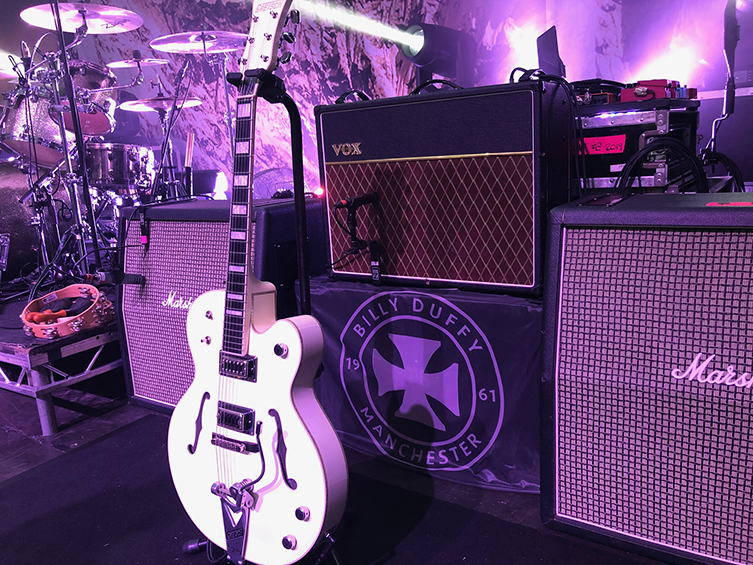
GG: The CC2 model?
BD: Yeah, the cheaper one! I was like ‘Have that one back and give me a couple of the Chinese ones cos they integrate with my quote-unquote Marshall, cos I use Friedmans. On a tour like this I’m using rented (Marshall JCM) 800’s, you know, and we’ll get to that in a second, because it’s just not feasible to freight around gear anymore, even at the level of this (tour).
GG: Yeah, loads of guys that I talk to are now using Kempers.
BD: Yeah, I won’t kinda do that yet: I haven’t quite gone down that road, cos I can still...my goal is basically to keep it still stomp-boxes that are replaceable, that can go on a plane, rented amps, you just make sure you get enough of ‘em to make sure. And I know the reissue 800s are good because I can’t get along with the 900s, they’re like sizzling bacon. It’s like Guitar Center Hero playing. It sounds great quiet. (makes a ‘zzzzzzzzzzzzz’ noise)
GG: It sounds fine on its own till everybody else in the band turns up...
BD: Oooohhh!!!! I’m not a fan, but the 800s work great for me, you know, they’re good enough, and the key to me: I get a good, ballsy, if you will, Malcolm-on-steroids sound, but then I need to be Angus as well.
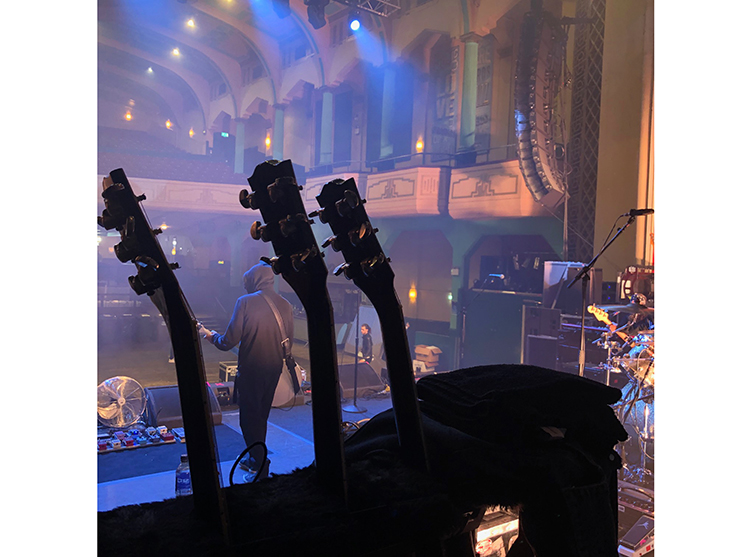
GG: Yeah.
BD: And a bit o’ me, so I use a couple of different overdrives and a line-level boost. That’s basically it, in terms of trickery.
GG: Ok.
BD: You know.
GG: The famous intro to She Sells Sanctuary has flangers and stuff...
BD: Yeah, I did away with that: it was too difficult to recreate that, you know, on a Tuesday night in Bulgaria. (laughs) It wasn’t working as well, so in the end, what we did was, I just keep it to the essential components and I let the Chorus, we got Chorusing through the AC30, cuz there’s nothing really that sounds like a (Roland Jazz Chorus) JC120.
GG: It seems to be a continuing problem! They keep bringing out other versions of it...
BD: ...and it’s not. Nothing sounds the same as a JC120.
GG: The original Chorus pedal, the CE-1...
BD: Yeah, yeah!
GG: They keep giving us these versions, and they all sound lovely, but everybody still thinks...
BD: ...that’s the best. I never used Chorus pedals. I’m using one now, cuz they brought out one that, one of the settings is good, and it’s just on the AC30. To be honest, my sound guy likes to use some plugins that have some effects on them.
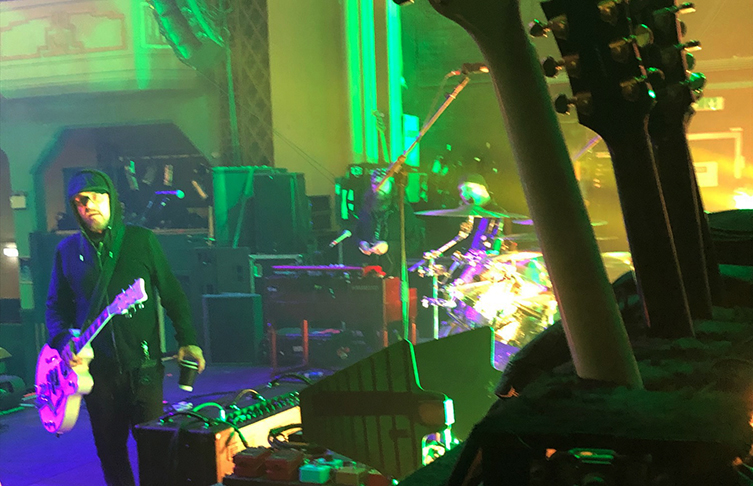
GG: Like Front of House? (‘Front of House’ refers to what the audience hears, rather than the artist. – Ray)
BD: Yeah.
GG: So that the audience get to hear a bit of the effected stuff, but you don’t have to worry about dealing with the extra stomping?
BD: Yeah.
GG: That’s the way, isn’t it?
BD: Well, it keeps it simpler. For two songs, to have two extra pedals on the board, all the extra wiring and extra weight, for two tunes. Important songs though they may be, at the end of the day, we just came to the conclusion that I think we can cover it. I mean, see what you think when you hear they show, you know. (He covered it! Ray)
GG: I think if the audience get an overall better show, they’ll forgive you!
BD: Yeah! Yeah! It’s easier for the sound guy, he’s happier! He’s like: ‘honestly, I prefer it when you don’t to this, and you don’t do delays, I got all that!
GG: Oh, cool!
BD: Of course, that becomes a problem when you get a sound guy who doesn’t know what your thing is...but right now, that’s not an issue. We’ve had the same guy, Steve, for a while.
GG: So, what about things like strings and plectrums? Have you got a preference for different gauges on different guitars?
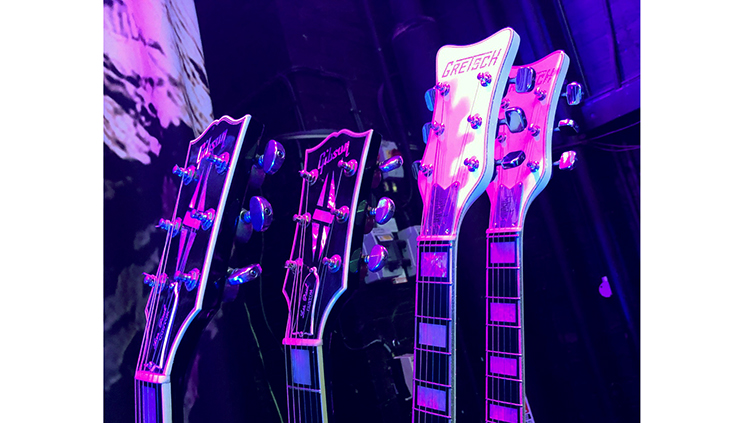
BD: No, only...actually, I was using, I was like Superman, I was using elevens. Live, we’ve been half a step down since like ’89 I think, we went half a step down because it sounds heavier. I went back to using tens because it was just killing my fingers. In the end I was just like ‘I don’t need to be a hero’, so I just use tens. I’ve been with Ernie Ball since time immemorial, and they’ve got these new power wound ones (Ernie Ball Paradigm). They also make extra-long length ones, for the Falcon, for me, just because the length is incredible, so the D and the G, they go...
GG: You’ve got a Bigsby on your Falcons as well, don’t you?
BD: Yeah, so it’s long. And that’s about it! Plectrums, I still use Herco Flex 50, which luckily got bought up by Dunlop. Dunlop look after me, so I use those. People think, ‘Oh, they’re quite thin’, but I use them sideways.
GG: That was something I read about! How...
BD: It was just a habit I go into, it wasn’t like a big deal: it wasn’t like some Brian May thing where I thought I was being clever! (laughs) It just occurred to me, after ten years of playing, that I hold them sideways and that is actually a bit unusual.
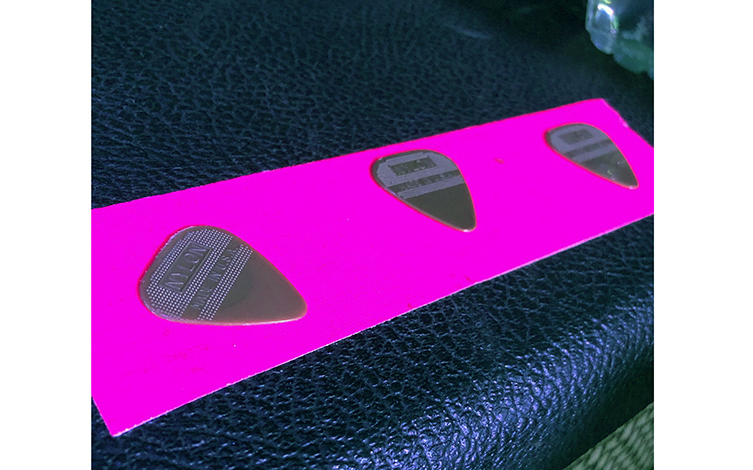
GG: Do you get a wee bit of the pick’s texture then?
BD: Yeah.
GG: Cuz that’s like The Edge, he holds his backwards.
BD: Yeah.
GG: I can’t remember the type he uses (it’s a Blue Herdim pick, very similar to the Herco picks that Billy uses – Ray) but it’s the same idea: the texture bites the string.
BD: Yeah: Bites the string different! My tech found that, you should mention that to him. He was sound checking a lot and he’s a very good guitar player, as you’re about to hear, (guitar murmurings from the stage are beginning to sound through the dressing room walls) and he was like: ‘I just can’t get it the same! I can see what you’re doing but I can’t...’ and I said: ‘what way are you holding the pick?’ and he just went ‘regular fries’, and I went ‘Shht’ (mimes moving the pick around) and he went ‘Ahh, there it is!’
So, it’s a thing! Again, it’s not any great grand design, it’s just, it was more retrospectively it occurred to me that that’s what I’ve been doing for years (laughs). Just easier to hold!
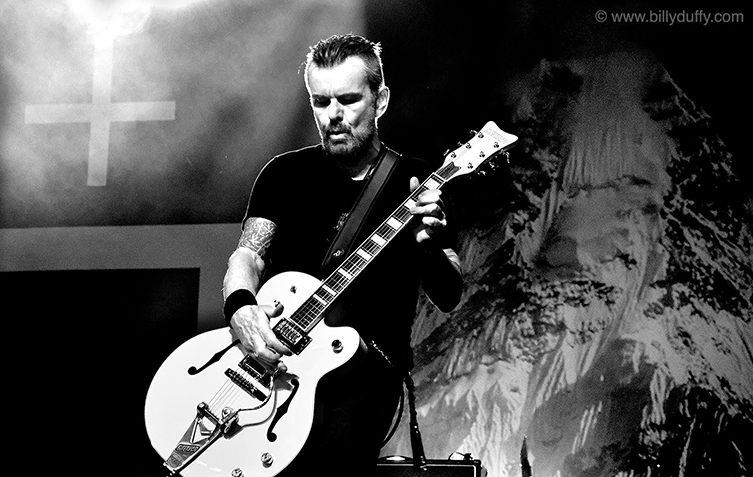
GG: Yeah, yeah! I never considered that, but yeah! That makes a lot of sense. I noticed that, in a couple of days, your auction’s gonna go live... (Billy is auctioning off hundreds of items of Cult and Theatre of Hate memorabilia, as well as historic concert ticket stubs and a few choice instruments - Ray)
BD: Yeah!
GG: All that stuff! There’s a couple of nice guitars on there: are you sad to see them go?
BD: Not really! I’m not that sentimental about stuff like that to be honest. I’m not completely without feelings...
GG: Well, you’ve hung onto all that stuff for a long time.
BD: Yeah! Generally, what is was...I don’t know if you ever...people go through this, it’s sat in boxes in my parents’ attic, then it was in my attic...and I’d go home and I’d look at it and every time I’d open one it would be like all these memories and like, bittersweet things. At one point, I was like: what can I do with this? So, in the end I thought: you know, we’re gonna archive it, and I’ll get the pictures and the memories all in there, and let people who are really into collecting it collect it and have it, and I’ll give some of the proceeds to charity, so everybody wins a bit, including me.
GG: Also, when you get those old kinds of feelings, it’s a bit heart-breaking, a bit grim: you don’t want to look back for too long!
BD: Yeah, that’s honestly, that type of area...you know, and I’m happy that it’s been documented, and I actually let somebody else put it together cos I couldn’t have done it, I’d never have done it! So, I gave them the basic stuff and Mick, who does my website, helped, and I let somebody else look at it. They’re looking at it from a completely professional point of view with no emotion attached. I’m like ‘I don’t know what this shit’s worth! You’re the auctioneers, you did Peter Hook’s one’, and it seemed to make sense that most of this stuff was in Manchester, they (the auctioneers) are a North Western thing, it all just sort of organically fell together.
At times I’m thinking ‘What am I doing? I’m selling the family silver!’ and other times I’m like...it’s like that feeling you were saying, but sometimes it’s just good to have a clear out! It’s good.
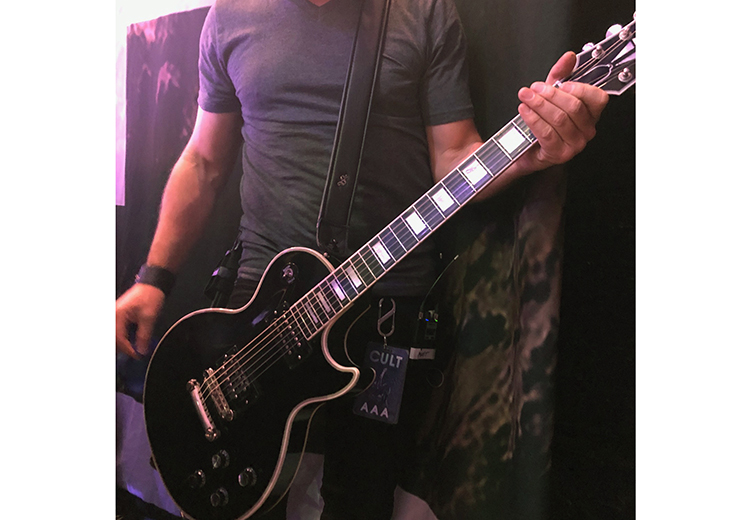
GG: Sometimes there’s the benefit of a bit of mental space too.
BD: Yeah, a little bit, for me. So, it just fell in place and I’ve been trying to do it, so that was that.
GG: Talking about your past and so on, one of the lots that was up for a while was the postcard that Morrissey sent you!
BD: Yeah!
GG: It’s so good to see that!
BD: Yeah, yeah but in the end, I pulled that and the letter from him out of the auction as they were very special to me. I’d actually forgotten that I had them amongst all the other stuff in my attic.
GG: But it just showed up?
BD: Yeah. The sale was primarily Cult-orientated and then we found out there was other stuff in there: Theatre of Hate, bits to do with Morrissey and a couple of other bands I’d been in. I was in America when the auction house sorted through my collection and I was presented with two hundred lots to go through in the catalogue and make sure they were correct. But on those items I thought actually I’d rather keep them for myself.
GG: I didn’t know the background! I watched the film recently, England is Mine (recent biopic about Morrissey’s pre-Smiths days) ...
BD: Oh, right, right.
GG: My other half is a massive Morrissey fan.
BD: Right, right.
GG: So it was ‘pre-Morrissey’ Morrissey, right?
BD: Right! Yeah.
GG: And you’re in it as a young guy!
BD: Yeah yeah!
GG: How did you feel about how it (your early life) was represented?
BD: Well, I kinda consulted on the movie coz I met the guys doing it and they seemed to have quite a good bit of integrity. They wanted to make something respectful and cool. A friend of mine, a mutual friend, was the guy who did Control (biopic of Joy Division singer Ian Curtis) and he introduced me to these guys. He said they wanted to make this small film about...and I was like ‘Not the Smiths!’ Haha! Because I can’t. I’m nothing to do with that, you know...
GG: It’s a separate subject.
BD: Yeah, so nope, not up for it. And they said ‘No no, not the Smiths! Specifically, right up until that’. So I said ‘Oh, that’s interesting!’ And so, then we met, we got along, and I just kind of consulted on the film for a little bit.
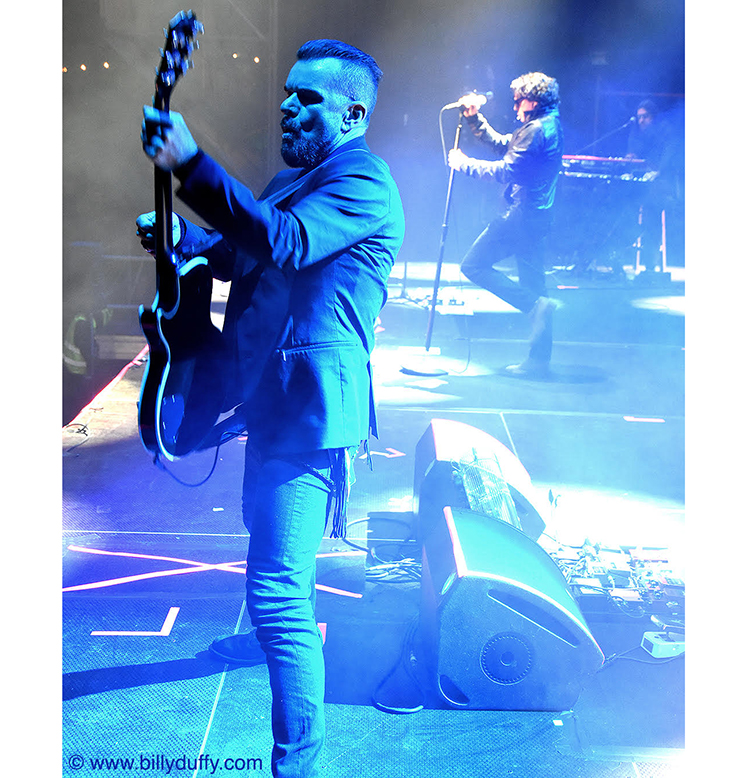
GG: The guy who plays you is quite convincing! Certainly, from an audience’s point of view!
BD: He’s become my, like, son! He’s like my surrogate son, he goes around like he’s mine. He was at the gig in Birmingham, he came down and got a free dinner cos he was like ‘Oh, I’m his nephew!’ He’s quite believable, he does look a bit like me, yeah! He’s a good lad, we’ve become friends, it’s kinda funny. We get along great.
GG: He’s your alter-ego!
BD: Yeah, it’s weird. You know, it’s like the son I never had.
GG: Exactly, haha! Cool man. Do you still keep up with Morrissey?
BD: No, I’ve not had a lot of direct contact with him at all but, you know, I read his book, and I seemed to come out of it quite favourably, there was no negativity. I’ve had nothing but...the biggest thing I learned from that film was, obviously as a young man, if you’ve seen the film, I bugger off to London, and my attention is on me and mine and London and what I’m doing. I didn’t...the movie made me realize the impact that might have had.
GG: Oh wow!
BD: Cos I’m 18, I’m a child, I’m selfish! I just got offered a record deal, a flat in London, and managed by David Bowie’s old manager, and I’m living with my parents in Manchester, signing on.
GG: Yeah, what else are you supposed to do? Haha!
BD: You know what I mean? And whilst I was the one, I felt, that initially saw what Moz had, he had something, for sure! All of us knew that: what is was, no one knew, and none of us knew what it was gonna become. But I was definitely the first one to man up and say: ‘Let’s do it’ and ‘here’s a gig’ and ‘get up and do it’. So that’s all the movie’s saying, and I did introduce him to Johnny (Marr), who’s a good mate, still, so. But I don’t have a lot of, you know...
GG: He (Morrissey) is kind of separate to things...
BD: Yeah, he’s doing his own thing, and, you know, I’m a fan: I like his stuff.
GG: I just didn’t ever put those two together, the Smiths and the Cult, until I saw that movie. And I thought, since you are both out in Los Angeles these days, maybe you’d see something of each other.
BD: He’s not anymore. He was, but...I did introduce him and Johnny, and you know...
GG: Significant stuff, like.
BD: It just happened. It wasn’t like...
GG: Yeah, just ‘here’s your mate’...
BD: And I thought they’d tell the story, coz then people ask! It’s like: that’s the movie, it pretty much went down like that, give or take, you know? It’s close enough! That’s kinda what happened, so if you’re a Morrissey fan, or whatever, if you’re curious...
GG: Do you think the chap who played Morrissey did a pretty good job?
BD: Well he did a good job, the main thing I was just was saying about Steven when he was younger, was he had and maintained a very strong sense of humour, as a human being. I think that was his defence against quite a brutal punk rock, punch-you-in-the-face world that we were inhabiting in Central Manchester in ’76, ’77 and ’78, right? Cos that’s the era. I went to London in January ’79, so we’re talking ’78. So, it was still kinda punky, you know? It was like the ‘Oi’ movement had started, there was a lot of aggro, the Pistols had just split up in early ’78, right? Just to contextualise the atmosphere a bit. And he wasn’t Jimmy Purcey (laughs), do you know what I mean? As a frontman. That was the thing.
GG: Yeah totally! Well, there are a couple of other things I like to touch on, if you’ve got the time?
BD: Yeah.
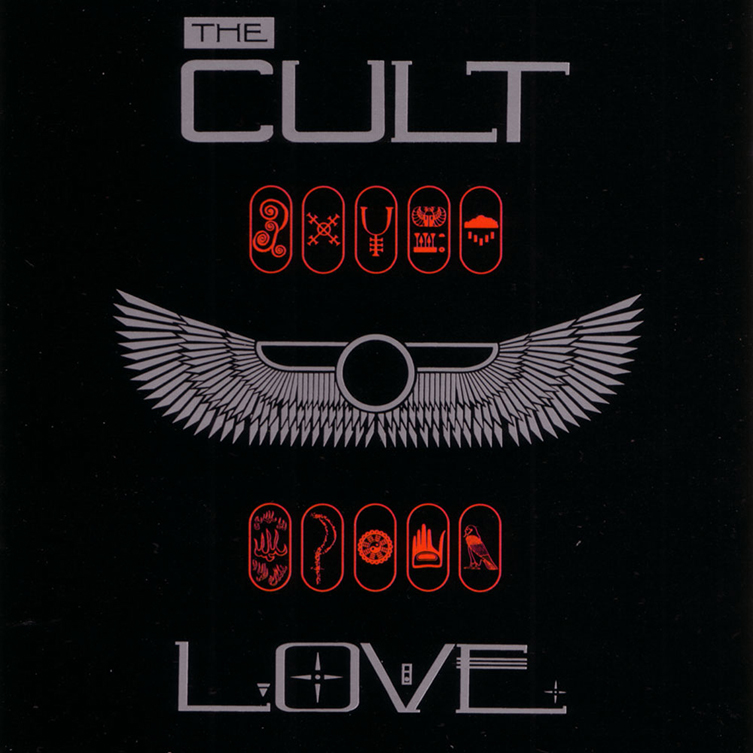
GG: How does it feel for you as an artist, to have worked on a body of music that has lasted well and not aged particularly badly at all? That post-punk sound we spoke about earlier, with your kind of expansive 80s tone, it reminds me of Jane’s Addiction, The Cure and so on: this kind of colourful, alternative, mystical sound and then this straight up Hard Rock that amalgamates. That whole sound just ages really well. How does that make you feel as an artist and songwriter?
BD: Erm, I mean, I’m pleased! I think the only downside of that is if you’re a bit of a kind of a pioneer or a hybrid, you’re not easily aligned with a particular movement, that can be stressful, trying to break new ground. If you come just after that, the groundwork’s been done. The pathfinding bit’s chopping through the woods and then the path becomes a bit more easy to follow.
So that’s been a bit stressful, and navigating it ourselves, staying true to like, the end of the day, any band: Jane’s, the Cure, whoever you want to refer to, it’s a guy, it’s a couple of guys in a room with a blank canvas and they come up with a tune. In essence, it’s that. It’s something you got to turn yourself on, musically. It’s not as much of a head game as a heart game, initially. The battle is to keep the heart in it later. There’re times when you get to a point, and I’m sure every band’s been through it where somebody says to me after I write a riff, or Ian says to me: ‘Sounds a bit like the Cult, that.’ (smiles)
GG: Hahaha, guess why?
BD: An’ I’m like Ehhhhh? But I know what he meant!
GG: Totally.
BD: And you know what he meant.
GG: Yeah.
BD: An’ he knew what he meant! And that’s the problem! (laughs)
GG: Hahaha! You want it to sound kind of like the Cult, but not too much like the Cult.
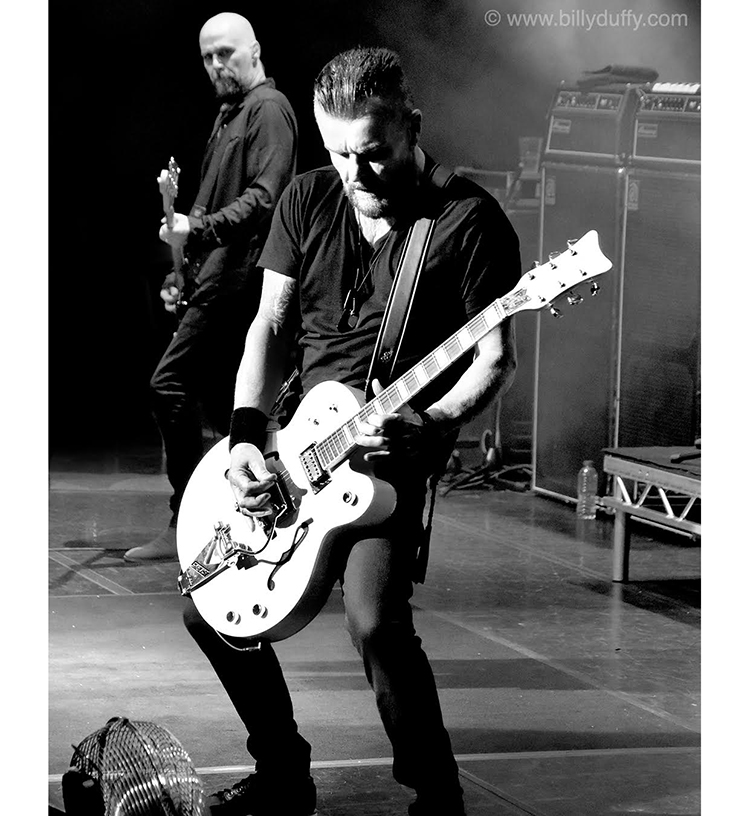
BD: That’s the game! And that what I’m sure every band who survives...you know, nothing’s changed: a good tune’s a good tune, and if you keep together as a band and entertain your fans as best you can, you’ll get the longevity. And we were fortunate that we had three very, you know, disparate sounding albums in the space of 6 years, it wasn’t like a massive time span. It’s actually less than six years. Love, Electric and Sonic Temple. They all, in their own way did well, and had songs that people still relate to: same band, pretty much, very kinda different, if you go from Hollow Man to Sweet Soul Sister. But it’s partially being socially experimental.
I think, and it’s just a little theory, that a lot of the...y’know, you come out of punk, and you’ve got like the Skids, being Scottish, it’s relevant, and (Stuart) Adamson had a thing. Like, after punk, he was one of the first ones to have a thing. After that, you got Simple Minds, then in Ireland you had U2, and then you had Echo and the Bunnymen (In Liverpool), then you had the (Psychedelic) Furs in London, with their kind of take on ‘what do we do?’ We were all fans of punk but none of us wanted to sound like the Sex Pistols or the Clash, so how do we progress? And we need tools to progress. All those bands are guitar-orientated bands, so then when you find these guitar players - I’d throw myself in the ring eventually, a little bit later though, I was in Theatre of Hate for a minute - trying to navigate who you do after this...what do you do after ‘Never Mind the Bollocks’? Where do you go with that? Do you know what I mean? And where you go is where we all went. We took a little time and we absorbed different influences, but I think you get the general thrust.
GG: And also Joy Division as well?
BD: Well yeah, but I’ll be honest, I’ll fess up! I don’t wanna jump in any bandwagons: I didn’t care for Joy Division originally. It didn’t get that Germanic...I was much more into that organic, New York Dolls, Iggy and the Stooges, Generation X, Rich Kids, the Pistols. You know, that austere, kind of (mimes dancing with elbows, like Ian Curtis). It was...
GG: You were into more American sounds?
BD: Yeah! Just being honest, I’m not trying to score any points in, like, the Q awards or anything. (laughs) Now, I get it! Now, I’m all over it! And at the time, I knew him, I mean, the band I had with Moz, we rehearsed next door to them.
GG: Wow, talk about historic!
BD: And heard them play (Iggy Pop song, co-written by David Bowie) Sister Midnight five thousand times! Cuz we both liked, everybody liked Iggy Pop!
GG: It’s a great tune!
BD: Everybody liked The Idiot and Lust for Life! New Values, you know? We were all into that, it was all going down! So, we had that in common, but I was coming at it from the Stooges’ Rock side, and they were coming at it from the Can, Berlin, Germany, y’know? You know what I mean! And the commonality was Iggy, with the influence of Bowie.
GG: I think that’s a great thing, though. Really disparate, different parts of the world, different music, but in common: Iggy Pop!
BD: Yeah, absolutely! What he was doing and his thing, you know. So that was at the time, but I was late on the Joy Division thing.
GG: Fair dos.
BD: And then, ultimately, and I’m sure you’ve interviewed loads of guys, you just, you know, you wake up in the morning and you put your boots on and you get out and you get on with your business of trying to make it as a Rock guy. There’s not a lot of strategic planning: you’re just getting on with it.
GG: That was one of the thing that I wanted to ask, because, see from an outside perspective of you: you’ve managed to play guitar for a living, you live in LA, ride motorbikes, doing well, touring the world, you’ve kind of like solved the puzzle! (Billy laughs) What advice have you got for us? What needs to be done? I know the world’s different now, but some things must apply, right?
BD: Yyyyeah, I know, it is different. Erm, just try and keep the heart in it. I think that’s the biggest battle. It’s a very...I would say just try and keep the heart in what you do. That’s the simplest way I can boil it down. You can fail if you, y’know...if you fail miserably on a commercial level, you’ll still be able to sleep at night because you did what you wanted to do. I’ve been fortunate, for the most part, that I’ve found a partner who...we have our toing and froing, but that tension is kinda what creates what it is. Cos if I had a singer who was a common or garden Blues-Rock singer, it’d be...I’m not gonna name any names, but it’d be the kind of bands that have had no advancement since 1971.
GG: Yeah, yeah. I can fill the blank...
BD: Haha, which is great, there’s a market for it, but we never...whilst we were like, ‘We’re gonna Rock’, it’s like: ‘but we wanna take this forward. Somehow!’ Even if you go back to take it forward, that’s the punk DNA in the band, of at least trying to be progressive. But we’re a guitar-orientated Rock band, we always have been. We just explore whatever we can honestly. My role is to come up with some melodic stuff, the hook n that, because that’s the Cult’s partnership. There aren’t Ian songs and Billy songs, really. We sort of write together: obviously, certain ones have more of my DNA than his and vice versa. Unlike a lot of bands, where you’ve got one guy who’s a complete songwriter and goes ‘here’s my song!’
GG: Learn this!
BD: Learn this, this is my one! We’ve never been that. So there’s always been that, umm, creative tension, and I don’t mean tension in a bad way, I mean tension in a good way, like...
GG: Pulling in slightly different directions...
BD: ...directions, and sometimes pulling in the same direction, but it makes it a little bit, to me at least, on the front foot and forward thinking. And that’s kind of where we’re still going with it. I mean, sometimes you go backwards to do that, but... (blows out cheeks) just dressing up as the Rolling Stones from 1970...it’s just not enough!
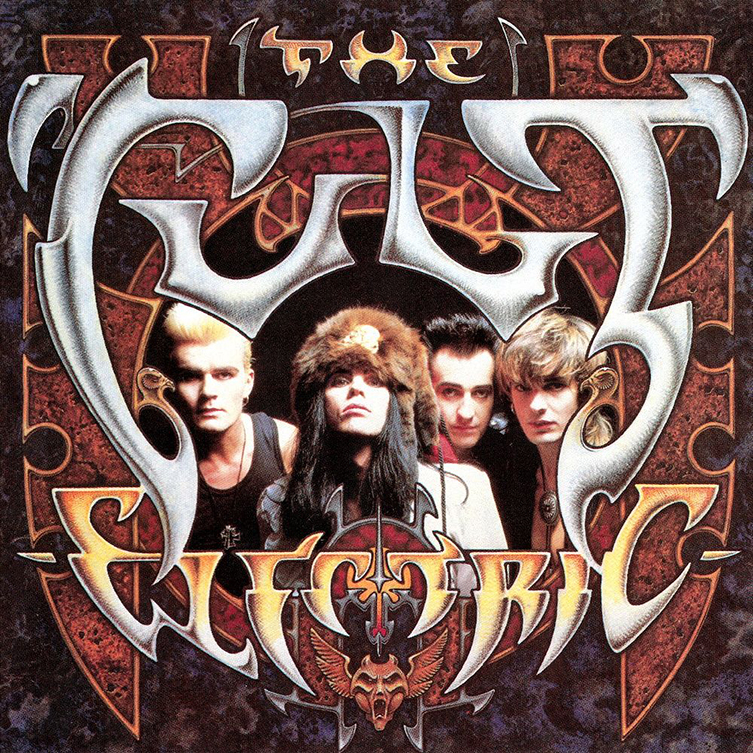
GG; Yeah, we’ve all already got the Rolling Stones from 1970 if we want them.
BD: Yeah. But by all means, absorb it. The Primals (Primal Scream) are a great example of a band who, you know, love ‘em or hate ‘em, they obviously love Rock, but it’s in their own way, and they do something interesting with it. And we do that in our own way, I like to feel, which is why we get on with them.
GG: One of the last things, and I don’t want to keep you too long, because you’ve been very good with me with your time, I really appreciate it...
BD: It’s alright.
GG: So, I don’t want you to speak on behalf of Ian, but the kind of mystical, Native American thing...
BD: Yeah, yeah, yeah, sure!
GG: ...is that something that you can get on board with and are interested in yourself? Or is that something that’s entirely separate to your appreciation of being in the Cult?
BD: Erm, well he’s always had that kind of interest, because, growing up in Canada, he picked that up because he was a bit, you know, that was his upbringing. He was a bit of an English immigrant and he felt a lot in common with a lot of Native American kids in Canada because they don’t have a border: they’re not Canadian or American, they’re just what they are. They don’t recognise that border.
GG: They were there first!
BD: Yeah, they were the first nation! (laughs) It’s just a different perspective, and I think Ian;s always just, with the Southern Death Cult, when I was his friend, we were helping them and I was in Theatre of Hate, they were like a baby band that we were helping, encouraging. I’ve always felt that he has a good perspective, and I support it. I don’t want to be him, you know? But it’s Humanist, even more so know 40 years later with the way the planet’s going. The Native Americans have always been about ‘respect the Earth’.
GG: Yeah, I mean, what else have we got?
BD: Well, we all need air! (laughs) If we start losig air and water, it doesn’t matter what kind of politics you’re into. But yeah, it’s a good question because it’s in the DNA of what he writes. It’s not there all the time and he’s also written silly songs about women.
GG: Definitely!
BD: Written in two minutes on the back of a napkin, type thing.
GG: Rock bands are allowed to do that!
BD: yeah, it’s okay! It’s alright, too! I would say though, in his credit, I think his lyrics were pretty strong on the last album. On Hidden City, I thought he really, really put a lot of effort into what he was trying to say and how he was saying it. Because, as a vocalist, I’m sure you have to compromise sometimes what you really want to say, cos it’s not poetry. It has to fit with the music. One of our partnership strengths is that he’ll listen to the music and it’ll evoke...you know, on a good day, it’ll evoke something in him, and he’ll go ‘that’s how that makes me feel’ and that’s how he navigates the lyrics. Since the inception, it’s always been two blokes sitting down in a room, like this, writing. It’s always been like 50/50. The Cult isn’t him, it isn’t me. It’s the ‘us’ of it.
Matt the Tech
After we finish our official conversation, we chat a little more whilst Billy makes himself a concoction of honey, lemon and hot water for his cold. Then leads me back through the labyrinth towards the stage. The Cult are just beginning their soundcheck, with full lighting, and it’s a pretty special thing to witness inside the otherwise dark cavern of the Academy. I’m introduced to Matt, Billy’s guitar tech, and I plant myself firmly next to him at the rack of Gibsons and Gretsches, stage left, whilst Billy and the guys (sans Astbury, who remains elusive throughout the day) blast through some classic Cult riffs and songs for a good half hour or so. It’s a real privilege to see this: a well-oiled band gearing up for a show. Everybody is relaxed and smiling as the musicians iron out a few points at the end of certain tunes. During all this, Matt points out certain things to me, like Billy's back-up pedal board that sits behind his amps, ready to be pulled out and plugged in if needed. Whilst Matt tells me this, he grabs a black Sharpie and begins marking the Gretsch's silver binding at the fret marker points along the side of the neck. "Is that so he can see the fret markers?", I yell, over the sounds of Spiritwalker. "Yeah! The silver and the lights!", replies Matt with a grin.
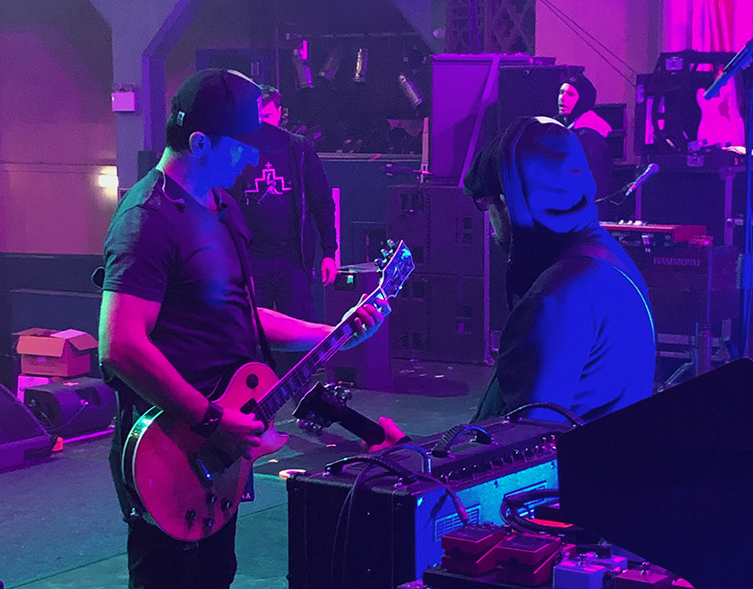
After the soundcheck, Billy shakes my hand and heads off for a coffee and a sit down (I've been told I can tire people out at the best of times), whilst I am left in the care of Matt, who is happy to talk me through Billy’s rig directly from the stage...
Matt: So, there’s two amps. There’s one Marshall head driving both cabinets and then an AC30. In the past, we’ve used the (Roland) Jazz Chorus 120 but we’re kinda playing with pretty reasonable volumes, right? (Blasts out a chord which is loud but certainly not horrifying in volume) The JC-120 was kinda hard to get the blend right.
GG: Was it too loud?
M: Yeah, it was too loud, especially if you put an overdrive pedal in front of it. It would quite often dominate everything. So, what I talked him into doing is, Boss makes an amazing Dimension Chorus..
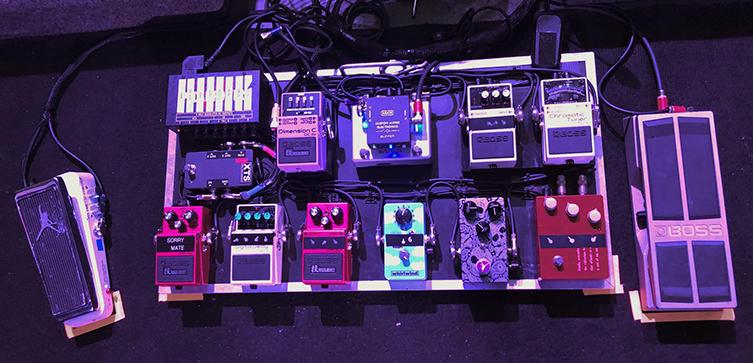
GG: The Waza Craft reissue?
M: Yeah, and I mean, the original pedal was a reissue of the rack unit.
GG: Of course! You’re totally right!
M: I’m fairly certain he used to use the rack mount version on the ’Love’ record, and uh, here, it’s just a real light Chorus sound (plays ‘Sanctuary’ intro), because the Chorus is only going through the AC30.
(I spy a famous red overdrive pedal at the side of Billy’s pedalboard)
GG: Oh, hey...is this a Klon Centaur?
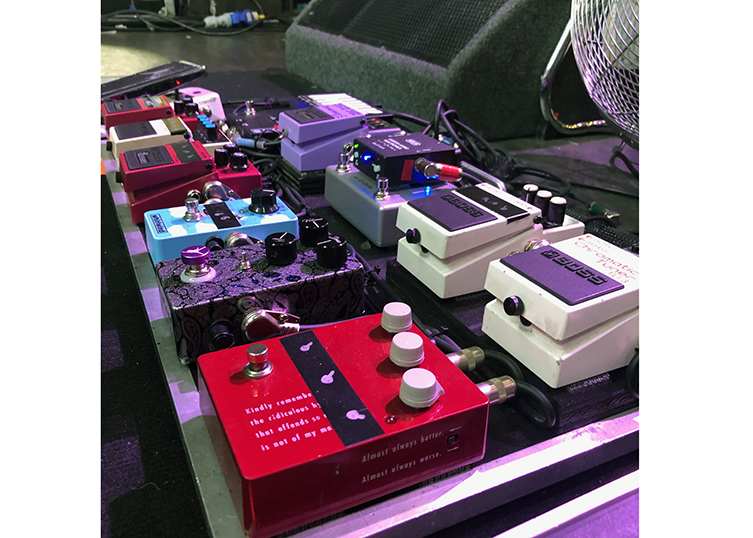
M: Yeah, yeah, this is a Klon KTR, not a Centaur, which is kind of the modern version of the Klon.
GG: This is the first time I’ve ever actually seen and heard one of these!
M: Oh really?
GG: Yeah, they’re very hard to get over here.
M: Yeah, they make them, they don’t make them...(plays a few choice licks which all sound pretty delicious through the Klon)
GG: It sounds mega.
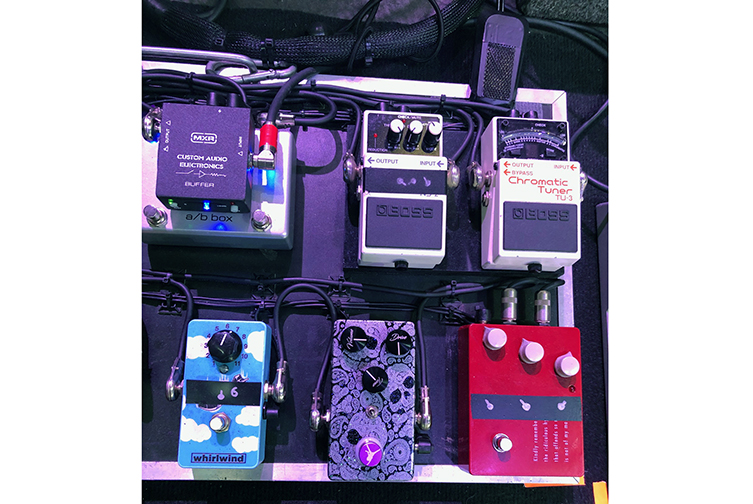
M: Yeah! And this is his other main overdrive, which is a Whirlwind Bomb. It’s kinda of a clean boost, which adds a lot of chimey top end, which he likes. So there’s that, and there’s this ‘visiting’ pedal: normally in this space we have a LovePedal Kalamazoo, which is a Pro Co Rat variant, but it’s not been getting a lot of use, lately, so we got introduced to Paul Flattley, from FGP, Flattley Guitar Pedals, a British maker. It’s pretty nice, it’s like his variation on a Tubescreamer. It’s a pretty classy approach to that sound. It’s got a ton of gain: as you can see, I’m using it with almost no gain on, just as a clean boost, and it also adds a nice little bit of compression. I enjoy it! Something like this is a little more applicable to where we’ve been winding up, for Billy.
We have a signature Wah from Dunlop that has two cool features. First of all, it’s got two voicings: one a little more vintage, the other’s a little more modern.
GG: Is it switchless?
M: It’s switchless, yeah. And then, just because it is switchless, and every so often there’s an optical circuit that’s bypassed, that can potentially go bad on it, or lose power or whatever, we’ve set up a true bypass to take it out the circuit. It’s just in case you lose the wah in the middle of a show or something like that, you can just hit the bypass and keep playing, I can swap the wah, and yeah!
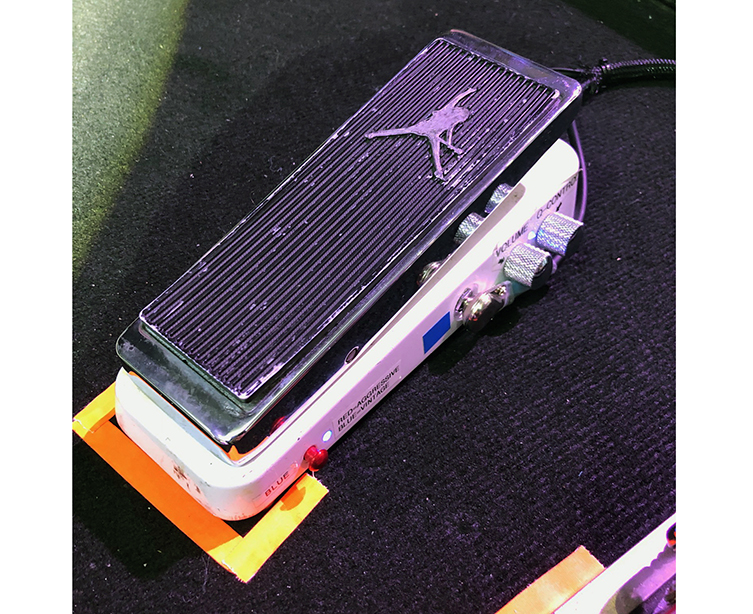
GG: Amazing! The show must go on!
M: Yeah! And I use this MXR Custom Audio buffer. The reason I use it is not so much for a buffer, cos we’re going wireless and stuff comes out buffered, but I’m using it as a little bit of a line driver for the guitar loom. And it also has a couple of voicing switches on it: this one has a high-end cut on it, that, kinda too me, offsets the coloration of the wireless and makes it sound more like a cable. The wireless always tends to make things a little bit thinner and brighter: this chops it off and fattens it up a bit.
GG: Perfect.
M: I really liked it for that, and so our friends at Dunlop sent us that.
GG: Great.
M: And then, our other friends at Boss gave us these great Waza Craft Delay pedals. Good sounding delay. And this one (it has a label saying ‘sorry mate’) for a more wet, kind-of Mick Ronson vibe. And that’s it! Pretty simple! We run all amps on all the time, no switching between them.
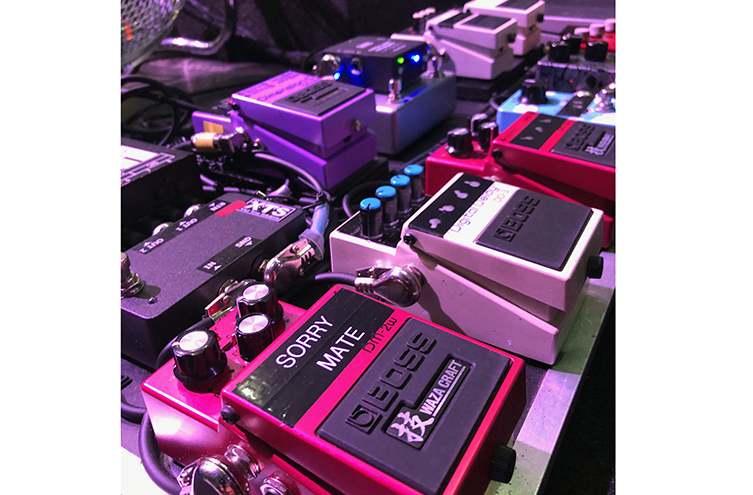
GG: So, Billy doesn’t tend to need much in the way of clean sounds? He just stays on overdrive the whole time?
M: Pretty much! A couple times he’ll get on his volume knob to clean it up. It’s a really comfortable way to play: just turn your amp up, maybe have one little overdrive pedal and then you’ve got all the colour you need right there in the volume knob. You can also self-mix, turn yourself down, blend better to other players.
GG: Good shout!
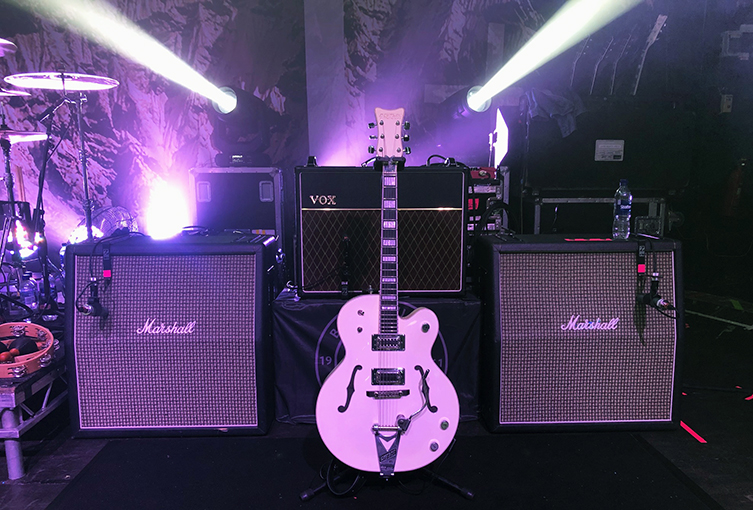
After that, Matt kindly helped me arrange Billy’s iconic Gretsch White Falcon on stage for a photo or two, whilst around us, crew members got on with their various tasks. Matt and I said our goodbyes and I headed back outside via the venue's side door. I'd expected twenty minutes of chat with Billy: instead, we'd spoken for around an hour (with around 42 minutes of that being recorded and transcribed above) and then I'd stayed for the forty or so minute soundcheck, followed by another ten minutes with Matt. The Cult's crew showed me such warmth and hospitality, making it a day to live long in the memory banks. I walked back to the guitarguitar office with a large smile on my face, ignoring the Glasgow rain.
Later that night, I returned and watched a powerful, joyous eruption of pure Rock n Roll, with colour, attitude, melody and vivacity. The band sounded great, the sold-out audience loved every second and Billy was every inch the star we all knew and expected him to be. There have since followed a string of sold out UK dates, with the Cult taking their Sonic Temple tour to the USA in December. I'd advise our American friends not to miss this tour, it's a stunning show!
My thanks this time go, not least, to Billy himself for agreeing to be interviewed, and for being such a pleasure to spend time with. Thanks are also due to Matt, Chuck Randall, Mick Peek and our good friends at Jim Dunlop for all of their help.
Keep up with the Sonic Temple 30th Anniversary tour at the Official Cult website. Billy's own website is excellent too, full of photos and documentation from across his entire career. Make sure you head over to the Billy Duffy website for more good stuff.
Thank you for reading! I'll be seeing you next time.


